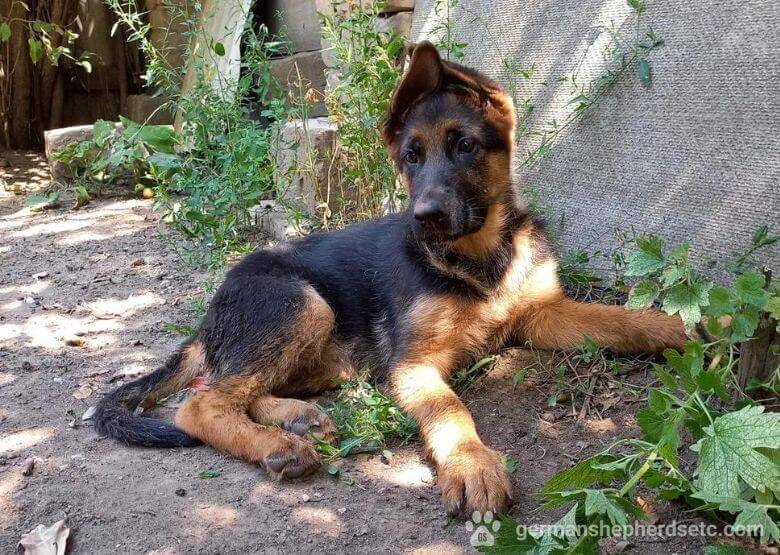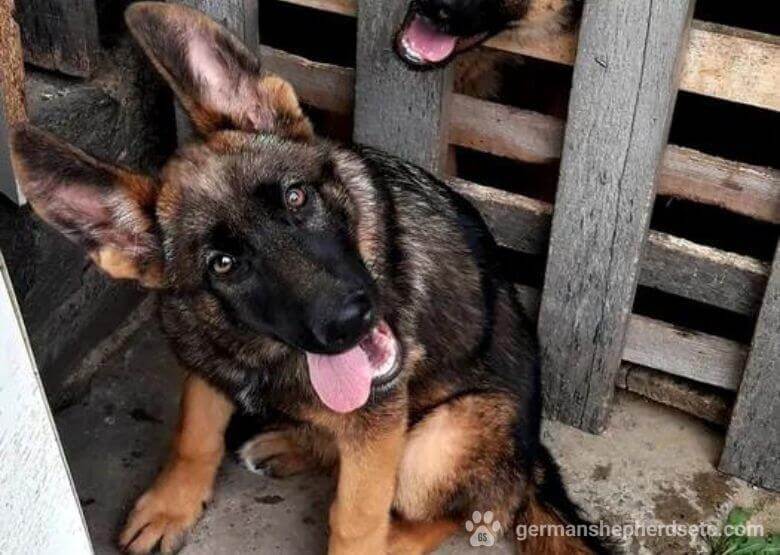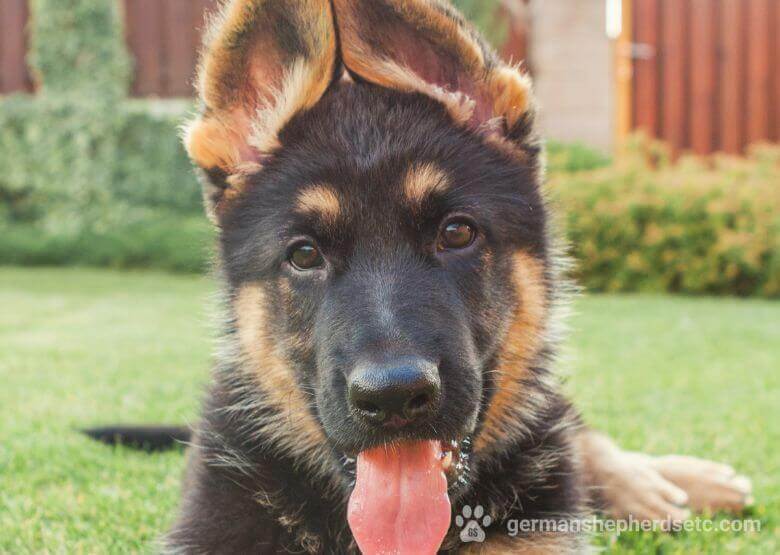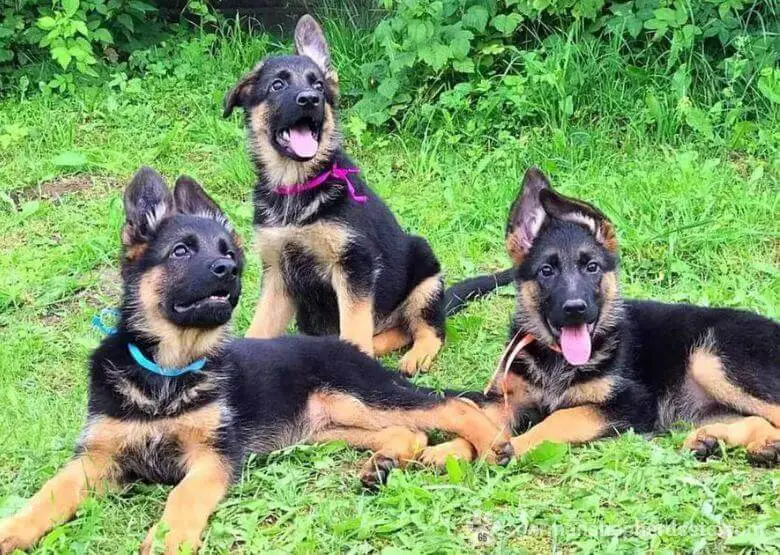Table of Contents
A 3 month old German Shepherd is still fluffy and cute, but it has changed a lot in comparison to its early days. It has become pretty tall, about one foot in height, with long paws and an extreme desire to chew something. Put away all your shoes, socks, or clothes because they may suffer badly from its teeth. Instead, buy entertaining chew toys and collect all your patience. You need to take proper care of your pup and keep its immense energy under control.
Your little puppy’s energy is truly overwhelming. So, you need to know how to train your German Shepherd for a happy and healthy future. This guide will help you learn more and let your ideal doggy live a long life full of positive experiences and adventures.
Size and Appearance
Your 3 month old GSD is still growing fast. If you have a boy, its height will be about 9-11 inches (23-28 cm). Girls are a bit lower at this age – they are about 8-10 inches (20-25 cm) tall.
You can also notice the increase in weight. The 3 month old German Shepherd weight can differ depending on several factors. Males can weigh 22-30 pounds (10-13 kg), while females weigh 17-26 pounds (8-12 kg). However, they can be even smaller if they belong to a working line. The gender difference becomes apparent at this age. The weight can also depend on the diet you feed your pup.
The changes in appearance also include the teething stage. At this time, your pup has all its milk teeth, so adult teeth growth starts. It will last for a few months until all the puppy teeth will be replaced.
You will notice one more dramatic change. It concerns the coat. Its fluffy and fuzzy nature will disappear because the adult fur starts growing. You will see a racing stripe on the back to show that the puppy coat has started to be replaced.
Your pup still has floppy ears that can stand straight from time to time. Though, you need to understand that during this period, the ears will not stand up steadily because teething needs a lot of calcium, and the ear cartilage cannot harden properly. Don’t worry. You will see a lot of improvements and a steadier ear position in a month or so. Remember not to pat your little one on the ears or head, or you may damage the cartilage.
Activity and Behavior

At the age of 3 months, your puppy’s neonatal period ends, and it officially enters the juvenile stage. It will last until your puppy is 6 months old and is characterized by immense energy, curiosity, and getting into trouble here and there. That is why socialization and training are so important in this period.
German Shepherd puppies at this age are very energetic. Though they look more grown-up than ever, their puppy nature always gets them into trouble, so you need to remain as patient as you can to train your little one the proper behavior.
Your pup may jump at people and bite them. So, train it to understand ‘no’ as soon as possible. Praise it with a treat if it can abstain from doing that.
Since your 3 month old German Shepherd puppy is full of energy, it needs a lot of exercise. Keep it busy all the time, but not make it do something heavy for a long time because it may have severe negative consequences on its health. Take it for walks as often as you can. A 15-minute walk is enough. The distance your pup can walk is up to 6 miles (9.5 km) per day. Though, don’t make it cover this distance in one go.
Moreover, your doggy needs a lot of other exercises. It can be a combination of playing fetch, running, and aerobic activities. You can make it play with a rubber toy or do some strength training. Once again, one-time sessions should not be very long.
If you cannot take your pup outside for a walk because it is very cold, play with it inside. It can be playing with a puzzle toy or hiding something in the house and asking your dog to find it.
If you have a car, you can take your puppy on a ride to provide it with more experience. Don’t forget to stop the car to let your friend relieve itself if needed. Overexercising can lead to problems with joints, so you need to be very careful.
The sleeping schedule of your puppy also changes a little at this age. It is approximately 16-20 hours per day. It can also wake you up at night and require playing or going potty. It is normal at this age. The fastest sleep for it is before dawn. When your doggy grows older, it won’t wake up at night because adult dogs sleep 9-14 hours per day, usually, it takes the whole night.
If you hesitate about how much your German Shepherd should sleep now, or whether it needs some sleep during the daytime, you can consult your vet.
Health and Care

Your 12 week old German Shepherd grows fast, and it looks healthy. However, you need to be aware of possible health issues at this age to be careful about. The first thing you have to keep in mind is weighing and measuring your doggy regularly. At this point, you should also provide it with the second set of vaccinations. It includes parvovirus, parainfluenza, hepatitis, and distemper.
Keep to a healthy and nutritious diet. Your dog won’t have any health problems at least until it is 5 years old if it is fed properly. If you have any doubts about the possibility of hereditary health conditions, get a DNA test. It is especially important if you want to prevent degenerative myelopathy.
However, if your healthy and happy doggy experiences the following symptoms, you should call your vet immediately:
- vomiting and/or diarrhea;
- excessive or insufficient urination;
- dry skin prone to swelling and itching;
- extreme thirst or non-characteristic hunger;
- coughing and sneezing;
- refusing to eat;
- changes in psycho or personality;
- unexplainable loss of weight;
- runny nose or eyes.
Even if your pup is healthy and merry, you need to take care of it regularly. Healthy diets, frequent walks, and enough exercise are all indisputable components of good puppy care.
Remember to groom and brush your doggy just twice per week. Changing the coat to an adult one will lead to excessive shedding. Try to help your pet get rid of the fur that is not needed anymore. You can even develop a specific schedule for grooming or make an appointment with a professional if you are not sure how to do it properly.
Don’t forget to socialize your doggy every time you face other people or animals. That can be a regular playdate with your dog-loving friends and their pets. Or you can help your pup meet new friends when you are walking with it in the park.
Potty walks are an essential part of care. A 3 month old GSD can hold its bladder for an hour or so. That is why you need to keep an eye on it and let it eliminate whenever it is needed without unnecessary inside accidents.
How to Feed a 3 Month Old GSD Puppy
Give your doggy only high-quality puppy kibble or other healthy food. Don’t opt for cheap kibble from a supermarket. Your little one needs only healthy nutrition to grow strong and intelligent. Be attentive about treats. They should not be more than 10% of all puppy’s food, or it will gain weight quickly. Obesity can cause other health problems with the heart, kidneys, and joints.
Now, it’s time to give your puppy two cups of kibble three times per day. Develop a feeding schedule and try to stick to it. If the puppy leaves some food in the bowl, take it away. Never leave the leftovers in the bowl, or your puppy will come back to them later, and it will be impossible to establish a feeding schedule. That will lead to potty accidents and digestion issues.
The diet has to be rich in protein, but be sure that it does not contain too much fat. The food should also contain phosphorus, calcium, and vitamins. You can use vitamin supplements meant for German Shepherd puppies, but never opt for those that are for humans or adult dogs.
The schedule is very important for your pet. If you establish it at three feeding times per day, try to keep to it. Distribute the amount of food evenly throughout all meals. It can be ¼-½ cups of dry kibble soaked a bit in goat milk or water per meal. Never feed your doggy immediately before going to bed. Provide it with enough water. Fresh water is essential for puppies, so the bowl full has to be around all the time. You do not need to take it away.
How to Train a 3 Month Old German Shepherd

A 12 week old German Shepherd puppy is very smart. It starts understanding what is going on around it. So, it needs proper training at this age. It should also learn how to interact with other animals and people.
Obedience training is essential at this time. You can start it with the most basic commands, for example, ‘sit’, ‘come’, ‘down’, or ‘stay’. Your puppy may not master all of them at once because its attention span is rather short, so be patient enough to repeat them again and again. Only after you see that your pet is confident about these commands, you may continue with more complicated ones.
Never punish or beat your puppy if something does not go well. That may cause fear and/or aggression attacks in the future. Positive reinforcement is always your priority. Never forget to praise your little dog and give it treats if it has done something well.
Your doggy should also know how to deal with other dogs. If you have a friend with a dog, invite them to your place or pay a visit to them with your pup. Your doggy will feel more confident if it knows how to build trust and socialize with other living beings.
Training is very important during this period. So, if you have not started doing it yet, begin your training sessions immediately. Your doggy should see a leader of the pack in you, so be as persistent and confident as possible. If you have some difficulties, it is better to seek the help of an expert.
You should be prepared to spend a lot of time training your pup. It may not be so easy at first, but it is certain to be rewarding.
FAQ
How big is a 3 month old German Shepherd?
The height of your puppy changes very quickly because its intensive growth continues. The male’s height is about 9-11 inches (23-28 cm) at the age of 3 months, while the girls are a bit lower – they grow up to about 8-10 inches (20-25.5 cm).
How much should a 3 month old German Shepherd weight?
There may be an apparent increase in weight at this age. It depends on several factors, such as hereditary options, type of line, feeding schedule, etc. On average, boys weigh 22-30 pounds (10-13.5 kg) when they are 3 months old, while girls weigh 17-26 pounds (7.7-11.8 kg). Puppies from the working line can weigh less.
How much should a 3 month old German Shepherd eat?
Your pup should eat 2 cups of dry kibble or homemade food per day. For more convenience, you should divide it into equal portions of ¼-½ cups per meal. Don’t forget about treats, but they do not have to be more than 10% of all the amount of daily food.
How much does a 3 month old German Shepherd sleep?
You will notice some changes in the sleep schedule of your pup. It needs less sleep, but the overall sleeping time is about 16-20 hours per day, including day naps. The puppy can still wake you up at night for playing or potty. Though, this will happen more rarely.
How far can a 3 month old German Shepherd walk?
It’s pretty surprising, but your pup can walk for up to 6 miles (9.5 km) per day. Though, don’t make it cover this distance in one go.
How much exercise should a 3 month old GSD get?
The puppy needs a lot of exercise at this age. At least 30 minutes per session can help it grow smart, alert, and strong. Walking and running for about 15 minutes can be a part of this exercise. However, you can include playing games into the sessions.
Final Thoughts
The first thing you need to remember when you have decided that a German Shepherd is a good breed for you is to be ready for taking a huge responsibility. A fluffy little puppy may get into a lot of trouble if you don’t take enough care of it. Be patient and positive. Never punish, shout at it, or beat it. However, you have to be consistent and demanding to let your 3 month old German Shepherd puppy feel that you are its leader, and it should follow and trust you.
German Shepherds, if properly trained, socialized, and cared for, are great family dogs. Nevertheless, this age sets the background for your pet’s future health, behavior, and activity. That is why you need to keep the advice from this article in mind and always contact your veterinarian if you have any questions or concerns.
